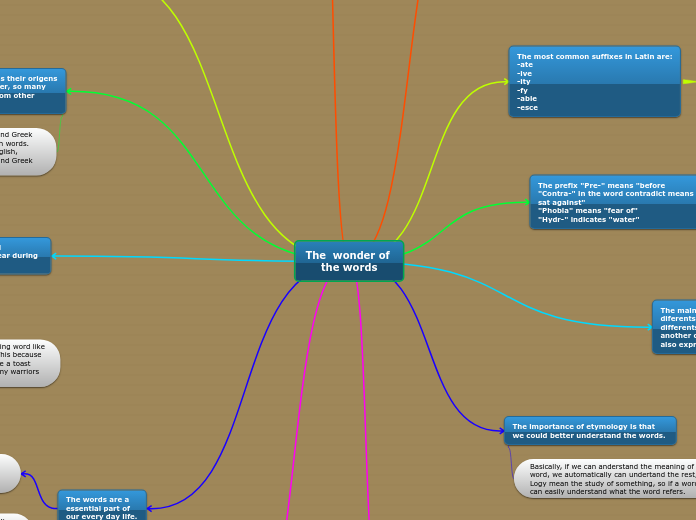The wonder of the words
One of the main properties of any language is that it continues to change according to the ages of humanity.
The same happened with English. In fact, if someone says "I'll buy an Alien" they mean a computer.
In conclusion, languages open our eyes to a new world of knowledge, but if the etymology is known, that knowledge will go beyond the limits of the mind.
The most common suffixes in Latin are:
-ate
-ive
-ity
-fy
-able
-esce
The most common suffixes in Anglo-Saxon are:
-ish
-ward
-less
-ly
-er
-ness
The prefix "Pre-" means "before
"Contra-" in the word contradict means "to sat against"
"Phobia" means "fear of"
"Hydr-" indicates "water"
The main reason that the language has diferents origens is because people from differents cultures came into contact with another one and they exchanged words and also expression.
The importance of etymology is that we could better understand the words.
Basically, if we can anderstand the meaning of some part of the word, we automatically can undertand the rest, for exmple:
Logy mean the study of something, so if a word ends in this we can easily understand what the word refers.
As we said previously, the etymology study the origen of the words, however, whats is the etymoloy of the word etymology?
The word "Etymology" comes from a combination betwen "Etimos" and "Logos"
Etimos mean "true meaning"
Logos mean "study of the science
Many English words are taken into a directly way from othe languages, this is known as "linguistic loan".
Menu = French
Boulevard = French
Beret = French
Canyon = Spanish
Mosquito = Spanish
From the Latin word "unus" in English is "one". So, "unity" means "join together as one" and "unique" means "one of its kind"
So many English wodrs has their origens in Latin and Greek, however, so many others has the origenes from other cultures.
An important thing is that the Latin and Greek are the foundation of so many English words. Thats why many people can learn English, becuse of the commonly used Latin and Greek prefixes and roots.
The most typical example of word contribution is when Vikings appear during the Anglo-Saxon period.
With the invasion and looting, the Vikings contributed words to English like "take".
An example of adaptation to the Viking word like "skål", in English would be "skull". This because the Vikings had the tradition of make a toast with the skulls of the strongest enemy warriors saying their frace "skål".
The words are a essential part of our every day life.
Without words, the civilization as we know it would not exist.
Acording time pass, new words in English has been created. Words like cellphone or smart TV.
To know the true origes of the word we need to known the etymology, the root of the word.
The word "sandwich" is named after John Montagu, 4th Earl of the town of Sandwich.
Also, we can understand words by breaking them down into small parts.
"Disaster" = Dis- means no and -aster means astro, relative to star. So, the word "Disaster" means "contrary to the stars"
